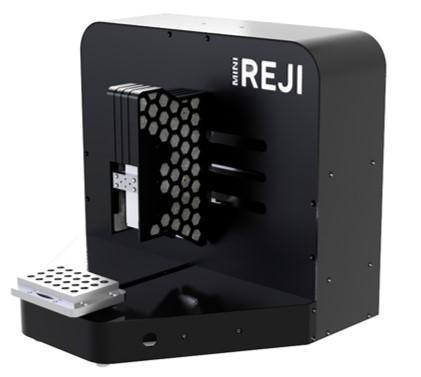Jetbio rolls-out its miniReJI 3D bioprinter. Researchers print models of osteoarthritis, leukaemia, and cardiac conditions.
 The Mini-REJI is a state-of-the-art bioprinter which allows for the creation of 3D tissue models using new patented technology.
The Mini-REJI is a state-of-the-art bioprinter which allows for the creation of 3D tissue models using new patented technology.The machine integrates three print modes: reactive jet impingement (REJI), microvalve and inkjet. Together these three print modes offer a flexible and integrated approach in the creation of 3D cell cultures.
• REJI bioprinting creates cell-filled-hydrogel 3D cultures, with the ability to print high cell densities and onto a wide range of substrates. Hydrogels can be tuned to specific applications through the introduction of specific proteins or peptides into the hydrogel formulations. REJI bioprinting is unique to Jetbio, patented in Europe and the US.
• Microvalve and inkjet printing deposit cells suspended in media, giving the ability to create a liquid culture alongside the hydrogel culture. Microvalve deposition is best for the deposition of larger volumes, inkjet for smaller volumes and high resolution, down to deposition of single cells.
- Bioprinting technology Reactive Jet Impingement (ReJI), Single Microvalve, Inkjet. Modular setup so users can rapidly swap between print modes.
- Printhead volume 3 mL cartridges for Single Microvalve & Inkjet. Two 3 mL cartridges for ReJI (gives 6 mL produced hydrogel).
- Minimum Droplet Volume Inkjet: ~200 pL Single Microvalve: ~25 nL ReJI: ~50 nL Environmental conditions Can print at temperatures up to 37°C and 70% humidity.
- Printhead flow rate range Up to 80 μl/s in ReJI mode Build surface compatibility Wide range of substrates, hard and soft materials and delicate structures.
- Petri dishes and multi-well plates (6 to 384 wells), titanium alloy, porous bioceramic, fibre, tissue, gel-on-gel.
- Travel of axes 240 x 200 x 100 mm Linear positioning precision XY: 1 µm (encoder resolution)
- Power supply Input: 110-240VAC, 50/60Hz, 2.0A Output: tuned for different components (5-24V)
- Outer dimensions (D x W x H) 500 mm x 430 mm x 450 mm
- Weight 25 kg
Jetbio is collaborating with End-Users on standard and bespoke applications on optimal miniReJI bioprinter configurations and “bioink” materials. Researchers have produced models of osteoarthritis, leukaemia, and cardiac conditions.
Jetbio has a policy of continuous product improvement. Specifications are updated regularly as our products develop and to address new customer applications. For more information CONTACT Dennis Camilleri email: dennis@jet-bio.com Web: www.jet-bio.com





















